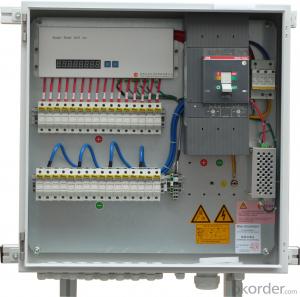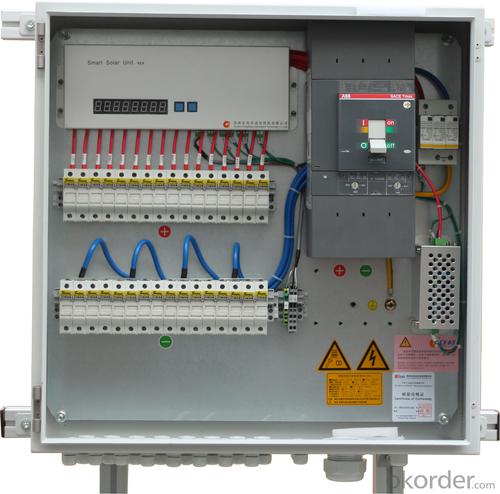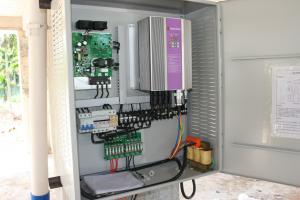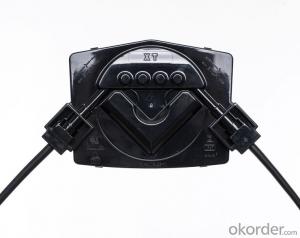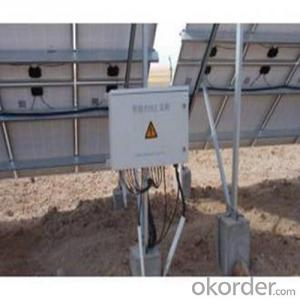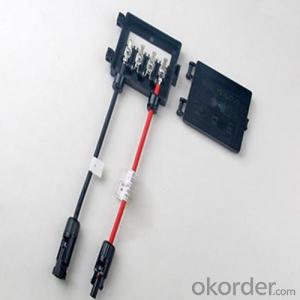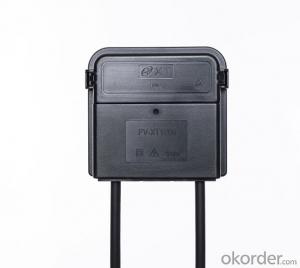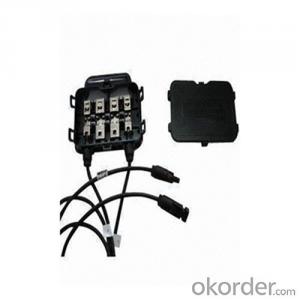Solar Energy Systems 101:TüV Certified PV Combiner Box
- Loading Port:
- Shanghai
- Payment Terms:
- TT OR LC
- Min Order Qty:
- -
- Supply Capability:
- 2000 set/month
OKorder Service Pledge
OKorder Financial Service
You Might Also Like
Company Profile
We are derived from an aviation factory , and it has the registered capital of 12million and is located in the Suzhou Industrial Park which is top of the world.That is the park where the world top enterprises are gathered and generated.
We aer the key new energy company supported by the park ; it is the onlycompany specialized in research and development of the China Photovoltaic Combiner Box and with independent intellectual property rights.
The fifth generation of Photovoltaic CombinerBox with real-time synchronous and multiple-access digital transmission , andDC arc detection is doing to be generated from the production line of Suzhou Changfeng Automation Technology Co.,Ltd.
Our business model: self-owned brand products marketing and ODM/OEM.
We will only produce the most safe Photovoltaic Combiner Box of the world.
CFAT PV CombinerBOX technicalfeatures
International excellent quality
1, the firstcertified by UL structure
2, Passed the TÜV / CE / CQC certification
Independent intellectual property rights
1,With 27 patents, wherein 10 of them are patents for invention
2,Passes the High-tech Product Certificate of Jiangsu province
Product advantages
Safe UL V0 levelinflaming retarding will definitely not catch fire
Reliable Theresearch process adopts the military standards of aviation
Durable 25 yearsof quality assurance, 5 yeas of “three guarantees” (for repair replacement orcompensation of faulty products) of products and 10 years of the box bodyguarantee can be provided
Product features
1、 Convenient: the 8th loop to the 16th loop are the same boxes withthe size of 600*600*210
2、 Solid: the material of the box is high-quality hot dip galvanizedplate, painted with outdoor toner, which will never fade and fall off
3、 Durable: 25years of quality guarantee, be able to adapt to theenvironment temperature of -30-70℃ and humidity 0-99%(without dew formation), and the protection gradeis higher than IP65
4、 Safe: UL V0 level inflaming retarding will definitely not catch fire
5、 Stable: the unique heat balance technology with the specialinternational excellent parts that meet the UL DC 1000V standards
6、 Advanced: computer aided design, embedded system, local/remote monitoringaccurate measurement
- Q: Are there any risks of electrical malfunctions or failures during extreme weather events with solar energy systems?
- Solar energy systems may encounter risks of electrical malfunctions or failures during extreme weather events. While solar panels are designed to withstand various weather conditions, such as rain, snow, and wind, they remain susceptible to damage in severe weather events like hurricanes, tornadoes, or severe storms. In extreme weather, high winds have the potential to physically harm solar panels by dislodging them from their mounts or causing them to break. Heavy snowfall can also cover the panels, reducing their efficiency and potentially causing them to collapse due to the weight. Additionally, lightning strikes during thunderstorms can jeopardize the electrical components of the solar energy system, leading to potential malfunctions or failures. Nevertheless, it is important to note that solar energy systems are typically equipped with safety measures to minimize these risks. Many solar panels undergo testing and certification to ensure they can withstand specific wind speeds and snow loads. Sturdy and secure mounting systems are utilized, and electrical components often have surge protection to safeguard against lightning strikes. Furthermore, solar energy systems are interconnected with the power grid, enabling a seamless transition to grid power during extreme weather events if needed. This helps mitigate the impact of potential malfunctions or failures. To mitigate the risks associated with extreme weather events, regular maintenance and inspection of solar energy systems are crucial. Periodic check-ups and cleaning can ensure the panels are in good condition, and any signs of damage or wear can be promptly addressed. It is also advisable to seek guidance from a professional installer or technician who can offer advice on specific weather-related risks and potential solutions.
- Q: How do solar energy systems impact water usage?
- Solar energy systems have a positive impact on water usage as they significantly reduce the amount of water needed for electricity generation compared to traditional fossil fuel power plants. Solar power does not require any water for its operation, whereas conventional power plants consume large amounts of water for cooling purposes. This water consumption can be detrimental to local ecosystems and water resources, especially in areas with limited water availability. Moreover, solar energy systems indirectly contribute to water conservation by reducing the reliance on other water-intensive energy sources. By shifting towards solar power, we can reduce the need for coal or natural gas power plants that consume vast amounts of water for cooling and extraction processes. This reduction in water usage not only preserves local water resources but also helps mitigate water scarcity issues that many regions face. Additionally, solar energy systems can also be integrated with water management infrastructure to further optimize water usage. For instance, solar panels can be installed on reservoirs or other water bodies, providing shade and reducing evaporation rates. This helps to conserve water and maintain reservoir levels, which are crucial for agriculture, drinking water supply, and ecosystem health. In summary, solar energy systems have a positive impact on water usage. They eliminate the need for water consumption in electricity generation and reduce reliance on water-intensive energy sources. Moreover, solar power can be combined with water management infrastructure to optimize water usage and conserve water resources. By embracing solar energy, we can contribute to a more sustainable and water-efficient future.
- Q: Can solar energy systems be used in powering disaster relief centers or emergency shelters?
- Yes, solar energy systems can definitely be used in powering disaster relief centers or emergency shelters. In fact, solar power is increasingly being utilized in such situations due to its numerous benefits. One of the key advantages of solar energy systems is their ability to function independently of the grid. During natural disasters or emergencies, the conventional power grid may be disrupted or completely unavailable. In such situations, solar panels can generate electricity from sunlight, providing a reliable and sustainable source of power for essential operations in relief centers or shelters. Solar energy systems are also highly portable and modular, making them ideal for temporary installations. They can be quickly deployed and set up in disaster-stricken areas, providing immediate power for lighting, communication devices, medical equipment, and other critical needs. Additionally, solar energy systems can be easily expanded or modified to meet the increasing energy demands of relief centers or shelters as the situation evolves. Furthermore, solar power systems have minimal environmental impact compared to traditional fuel-based generators. They produce clean energy without releasing harmful pollutants or greenhouse gases, which is particularly important in disaster-stricken areas where air quality may already be compromised. Lastly, solar energy systems offer long-term cost savings. Once installed, solar panels require minimal maintenance and have a lifespan of 25-30 years. This reduces the reliance on expensive and often scarce fuel supplies, allowing relief centers and emergency shelters to allocate their resources more efficiently. In conclusion, solar energy systems are a reliable, sustainable, and cost-effective solution for powering disaster relief centers or emergency shelters. Their ability to function independently, portability, minimal environmental impact, and long-term cost savings make them an excellent choice for powering critical operations during times of crisis.
- Q: Can a solar energy system store excess energy for later use?
- Yes, a solar energy system can store excess energy for later use. This is achieved through the use of batteries or other storage technologies. When a solar energy system generates more electricity than is needed in real-time, the excess energy can be stored in batteries. These batteries can then be used to power the system during periods of low solar generation, such as at night or during cloudy days. By storing excess energy, solar energy systems can provide a more reliable and continuous power supply, reducing the dependence on the grid and increasing self-consumption of renewable energy.
- Q: What is the impact of air pollution on solar panel efficiency?
- Air pollution can significantly reduce the efficiency of solar panels by blocking or scattering sunlight, leading to decreased energy production. The presence of particulate matter, such as dust, smog, or soot, on the surface of solar panels reduces the amount of sunlight that can penetrate and reach the photovoltaic cells, thus hindering their ability to convert sunlight into electricity. Additionally, air pollution can create a layer of dirt or grime on the panels, further diminishing their efficiency. Regular cleaning and maintenance of solar panels are essential to mitigate the impact of air pollution and ensure optimal energy generation.
- Q: How do solar energy systems affect the insurance premiums of a property?
- Solar energy systems can have a positive impact on insurance premiums for a property. By installing solar panels, the property becomes more environmentally friendly and less dependent on traditional energy sources, reducing the risk of damage or loss associated with power outages or utility failures. This can lead to lower insurance premiums as insurers recognize the decreased risk. Additionally, some insurance companies offer specialized policies or discounts specifically for properties with solar energy systems, further reducing premiums.
- Q: Can solar energy systems be used for heating and cooling purposes?
- Yes, solar energy systems can be used for heating and cooling purposes. Solar thermal systems can capture the sun's energy to heat water or air, which can then be used for heating purposes. Additionally, solar-powered air conditioning systems, known as solar cooling, use solar energy to power the cooling process, reducing energy consumption and greenhouse gas emissions.
- Q: Can solar energy systems be used in areas with limited access to housing?
- Yes, solar energy systems can be used in areas with limited access to housing. Solar panels can be installed on rooftops, open land, or even on portable structures like solar-powered tents or trailers. These systems can provide electricity and power to meet the energy needs of people living in remote or off-grid areas, where traditional power infrastructure may be limited or nonexistent. Additionally, advancements in solar technology, such as compact and lightweight panels, have made it easier to deploy solar systems in areas with limited housing options.
- Q: Can solar energy systems be used for powering off-grid eco-villages?
- Yes, solar energy systems can be used effectively for powering off-grid eco-villages. Solar panels can generate electricity by harnessing the power of the sun, providing a clean and renewable energy source for these communities. This allows eco-villages to become self-sufficient and reduce reliance on fossil fuels or traditional power grids. Additionally, advancements in battery storage technology enable the storage of excess solar energy for use during nights or cloudy days, ensuring a consistent power supply. Overall, solar energy systems are an ideal solution for powering off-grid eco-villages, promoting sustainability and reducing carbon emissions.
- Q: Can solar energy systems be used in areas with limited access to solar monitoring systems?
- Yes, solar energy systems can still be used in areas with limited access to solar monitoring systems. While solar monitoring systems provide valuable data about the performance of solar panels and optimize their efficiency, they are not essential for the basic functioning of solar energy systems. Solar panels can still generate electricity from sunlight without constant monitoring. In areas with limited access to solar monitoring systems, periodic maintenance and inspections can be conducted to ensure the proper functioning and performance of the solar energy system.
Send your message to us
Solar Energy Systems 101:TüV Certified PV Combiner Box
- Loading Port:
- Shanghai
- Payment Terms:
- TT OR LC
- Min Order Qty:
- -
- Supply Capability:
- 2000 set/month
OKorder Service Pledge
OKorder Financial Service
Similar products
Hot products
Hot Searches
Related keywords
